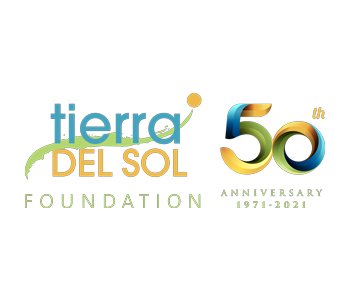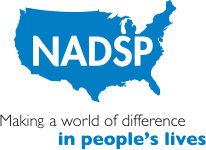
Tierra del Sol Foundation’s ‘Learning and Workforce Development’ Initiative
Submitted By: Karina Tovar
With good intent, funding agencies, such as HCBS and/or State Departments, sometimes create long-term challenges through short-term infusion of dollars into the system. Without the guarantee of long-term funds, it is almost impossible to push these funds through to the DSP level via wage increases. Yet, without increased earnings, the DSP crisis is real.
The Tierra del Sol (TdS) incentive program addresses both issues. The Learning and Workforce Development Initiative provides DSPs of the Tierra del Sol Foundation opportunities to improve or hone their skills and work practices through further education, training, and purposeful reflection as well as a means of increasing earnings on an annual basis. Using accredited programs such as Open Future Learning and the NADSP E-Badge Academy, which highlights staff professional achievements, TdS prepares staff to learn the required skill set to partner with the people they support, in an effort to launch folks out of poverty and into lives that are productive and personally meaningful.
TdS recognizes these commitments and professional developments through an incentive-based program, which honors these milestones with a generous monetary value. This in turn, stabilizes the financial base of the DSP workforce.
Impact Of The Program
The impact is twofold. TdS has set the highest outcome level to be that each person we support will have a clearly articulated personally meaningful and productive life plan including a path to paid employment. DSPs are the key to this success. Understanding person-centered thinking and planning is crucial to their success, therefore, this learning and development program is crucial to TdS’s success.
A secondary outcome of the design and implementation of this learning and development incentive program is market competitiveness. During times when recruitment is competitive and people are looking at different employment options, TdS stands out as an organization that values our staff including their own personal and professional educational goals.
The Learning and Development Incentive program has provided DSPs with not only agency-wide recognition, but also recognition at the national level. This recognition is well deserved. DSPs are the front line cadre of staff who are using new and creative measures to support their associates* in a person-centered way. DSPs are more than a personal care attendant and as such, need the skills and aptitudes to provide a wide range of support including but not limited to job coaching, natural support development, community inclusion development, understanding of community risks and mitigations plans, and the list goes on.
Often the complexity of this work goes unnoticed and unrecognized. This program has given those efforts the recognition through reflection and recognition as well as through financial rewards that are deserving of such endeavors.
Steps To Implement A Similar DSP Program
- Design and Implementation:
- Assign a representative to oversee the program and staff progress.
- Secure an accredited online training platform (Open Future Learning).
- Provide staff training on how to use Open Future Learning.
- Join the NADSP E-Badge Academy program
- Create and sustain an employee engagement plan:
- Roll out our Learning and Workforce Development Initiative Program through agency wide meetings.
- Provide staff ongoing training and support on how to use the NADSP platform and OFL in a combined fashion.
- Keep track of staff progress through an online spreadsheet.
- Once staff have met requirements for the Learning and/or Workforce Initiative, they will be recognized through a financial incentive.
- Send out employee recognition notices either via email or through video communication agency wide.
- Celebrate! Celebrate! Celebrate!
- Rinse and repeat steps 2-3.
How could other organizations replicate your efforts?
TdS believes that our program is successful due to the additional financial rewards attached to the learning and development program. Benchmarks and timelines are established proactively and communicated to staff annually. Therefore, an organization can address the budgetary costs of the program each year depending on available funding.
The replication scenario is straight forward. Agencies replicate this model by providing training and education required to give DSPs the tools and skill set via the NADSP Badge program in partnership with OFL, then reinforce achievement through monetary awards. Ultimately, supporting their associates* in finding paid employment while simultaneously building the professional portfolio of the DSP staff contingency.
What challenges may organizations face in implementation?
Challenges that arise might be twofold. One, the staff buy-in might be an initial challenge that organizations might face. This might be especially true if staff are entirely unfamiliar with the different training platforms being introduced. Tierra would recommend slowly introducing these new resources by spacing them a few weeks apart. For example, if an agency currently does not have an accredited training platform, they might want to start here and implement this first and once staff are comfortable with the new training platform, they can continue to the next stage (in this case, the NADSP E-Badge Academy).
TdS has found that frequent celebration is crucial to gaining ground with new endeavors, therefore creating a systematic method of highlighting staff as they begin to finish pre-established benchmarks. Tierra believes showcasing staff accomplishments motivates others to get started and makes the process seem attainable for those who are feeling unsure. Ongoing staff engagement and participation is key; it is recommended that various methodologies are identified to sustain the presence of the program front and center of all DSP staff.
Secondly, it is critical to gain full buy-in at the executive level. Walk the Walk – Talk the Talk is the motto recommended to garner full engagement across the agency, and it starts with full buy-in at the executive level. It is recommended that the executive team understand the full cost analysis of launching a program like this. It would benefit the executive team to consider in this cost analysis the following: cost of full implementation of learning and development staffing and curriculum, current turnover rate for the agency, cost of turnover for the agency, current cost of recruitment, and any retention benefits the agency has.
In doing so, a full cost benefit analysis will be conducted. For example, Tierra del Sol’s current employee turnover cost is at $12,000 and current annual turnover rate is 27.1% of 339 employees. Total cost of turnover to our bottom line is over $1M per year. Our internal analysis showed that our cost benefit would be in reducing the number of turnover and redirecting that money to incentivizing staff to stay through providing continual learning and education opportunities. Additionally, we were able to identify new revenue gains through funds acquired with job placement and retention of our associate body. It is a win-win.

About Tierra del Sol Foundation
The Tierra del Sol Foundation was founded in Sunland, CA, in 1971. Originally conceived by parents as an alternative to institutional care, Tierra began as an early demonstration of self-advocacy. The founding parents were determined to raise their sons and daughters as permanent members of their families, rather than abandon them to the State. The notion was simple; all people have gifts, and our community is richer when all our citizens are valued for their contributions. We have never lost these important principles.
Over the years, Tierra is not a place, rather it is a dynamic organization that empowers people with developmental disabilities to achieve excellence through Workforce Development, College to Career, and Careers in the Arts.
Help Us Carry Out Our Mission
You can join The National Alliance For Direct Support Professionals (NADSP) through NADSP Membership, and support us to elevate the status of direct support professionals.
You May Also Be Interested In …

The Long-Term Care Workforce Support Act

Action Alert: Certified Direct Support Professional to Testify to Senate Special Commitee

Meet Our 2024 Advocacy Symposium Keynote, Malachi Cereghino

